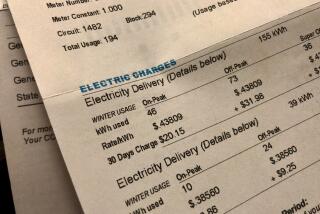As Short Calls Proliferate, Phone Firms Seek New Fees : Technology: Innovations like E-mail mean less time on the lines. Whether that raises costs is disputed.
- Share via
WASHINGTON — In a surprising side effect of new technologies, Americans’ telephone calls are suddenly getting much shorter--and if the phone companies have their way, those short calls will soon get much more expensive.
Despite the nation’s long love affair with leisurely phone chats, innovations such as pagers, voice mail, E-mail, electronic credit card readers and fax machines are now dramatically abbreviating telephone calls and luring longer connections off the public phone network.
Today, as people leave voice mail rather than calling back--or send E-mail rather than calling at all--about 52% of residential phone conversations last one minute or less, compared with 22% in 1982.
Telephone companies are not at all happy about this. They say it is costing them money--not because overall phone traffic is down (it isn’t), but because the first few seconds of a call, when the initial connection is made, are the most expensive to handle.
Not surprisingly, they have a solution: a new “setup” charge that could make some short calls as much as five times more expensive. Next week, the California Public Utilities Commission is expected to approve a request by Pacific Bell to levy such a charge for long-distance calls made within California. Pac Bell has proposed a similar fee for interstate calls in a petition recently filed with the Federal Communications Commission.
Eventually, the new fee could be extended to local calls as well, satisfying a longstanding phone company desire to move away from flat-rate monthly charges and require customers to pay for each call. But such changes are likely to anger consumers, and could thwart the development of computer on-line services and other emerging communications technologies.
Phone company finances aside, it is clear that new technologies are drastically altering the way the public telephone network is used. In Massachusetts, physicians whose staffs once spent hours placing long-distance and local calls to determine patients’ insurance eligibility now accomplish the same task in seconds by swiping a wallet-size ID card though an electronic scanner connected by phone lines to Blue Cross/Blue Shield.
In New York, Howard Sogren, senior vice president of global systems and technology at Merrill Lynch, says he hardly ever picks up his phone now that he can send electronic messages over his company’s private computer network. “In the last year I have reduced my need to have a phone conversation with anyone overseas by 90% and domestically, by about 60%,” he says.
Around the country, retailers are verifying credit cards electronically in seconds, rather than spending minutes on the phone. Companies of all stripes are finding they can make do with fewer personnel to field live phone calls: Operators and secretaries are being eliminated as electronic voice mail boxes are installed. And marketing is being transformed by computers that tirelessly dial homes to pitch products with a synthesized human voice that does not dally with customers.
“E-mail and voice mail reduce significantly the time” spent on the phone, said Dan Elron, a telecommunications expert at the New York offices of Coopers & Lybrand. The technology, Elron added, forces people to dispense with “extraneous issues like the weather and deal with things much faster.”
The social implications of these changes are ambiguous. And it is impossible to determine whether live conversations are actually any shorter than they used to be. Data about phone usage shows only whether a call has been completed, not what kind of traffic the call is carrying.
For the phone companies, none of this matters. What they see is a proliferation of costly, short calls. And they say current pricing encourages many of the users who make longer calls--big companies and government agencies that maintain lengthy connections with clients or satellite offices--to abandon the public phone network in favor of cheaper private lines.
“The problem with the current rate structure is you lose the winners and keep the losers,” said Ed Lowry, executive director of external affairs for Bell Atlantic Corp. “We have to be able to give our customers pricing options to keep them and get our rates more in line with costs.”
“The phone companies face a material loss of revenue unless they address the situation of the continuing proliferation of short-duration calls,” said Richard P. Nespola, president of Management Network Group Inc., a Leawood, Kans., consulting firm. “The market has changed. Communications are coming in short bursts.”
Pacific Bell contends that the new charge it is seeking would not affect consumers because it would be collected from long-distance carriers. But the long-distance companies, which already pay an “access charge” to local phone firms to cover the local portion of all calls, are likely to pass any higher costs along to consumers, experts say.
And some dispute the phone company argument that short calls are more expensive to carry. “This is telecom tomfoolery,” said Bruce Kushnick, president of New Networks Institute, a New York research firm. “Moving electrons over a wire does not cost more money. The telephone companies are simply restating their math” in order to win rate increases.
Computer on-line services and other heavy users of the public network are fiercely opposed to the new pricing proposals. “This obviously would have a deleterious impact on the nation’s economy and essentially would penalize CompuServe and similarly situated companies for making extremely efficient use of the public switched network,” said CompuServe, one of the nation’s leading computer on-line services, in a petition filed with the FCC last month.
Instead of pressing for such rate increases, CompuServe said, phone companies “should concentrate on finding less costly ways of setting up calls.”
Indeed, some find it peculiar that phone companies would be complaining about changing usage patterns, since new technologies in general are contributing to an unprecedented boom in communications, which in turn is creating major new opportunities for phone companies.
“Even though we’ve seen the development of value-added private networks that take telephone users off the public switched network, we tend to see growth in other areas that didn’t exist before,” said Bob Baulch, a manager of AT&T;’s communications service group in Morristown, N.J. “There is all kinds of private networking going on and to us that’s an accepted practice that does not (alarm us).”
Overall demand for phones is exploding so much, in fact, that some area codes could be filled to capacity in the next few years. What’s more, some phone innovations, such as voice mail and call waiting, allow millions of calls to be completed today that in the past might have gone unanswered or uncompleted.
But many of the additional lines being hooked up are devoted to fax machines, on-line computer services or other devices that communicate in relatively brief periods. Other added capacity does not directly financially benefit the local phone companies. For an industry seeking new revenue streams to modernize its networks, experts say the trend is ominous.
More to Read
Inside the business of entertainment
The Wide Shot brings you news, analysis and insights on everything from streaming wars to production — and what it all means for the future.
You may occasionally receive promotional content from the Los Angeles Times.










